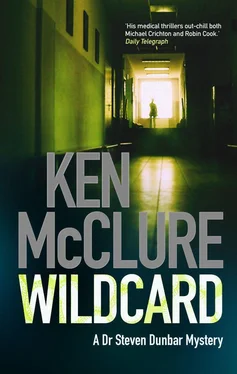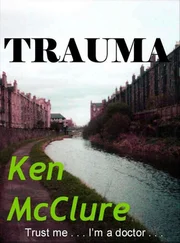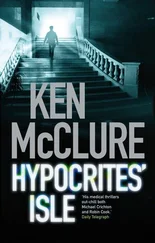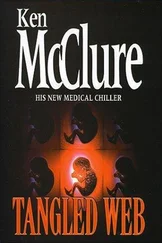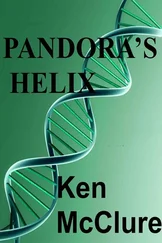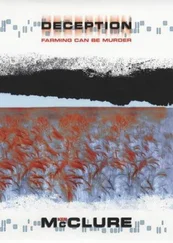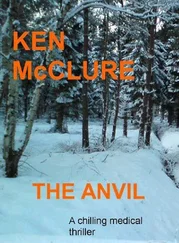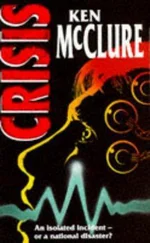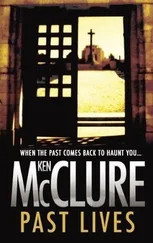Ken McClure - Wildcard
Здесь есть возможность читать онлайн «Ken McClure - Wildcard» весь текст электронной книги совершенно бесплатно (целиком полную версию без сокращений). В некоторых случаях можно слушать аудио, скачать через торрент в формате fb2 и присутствует краткое содержание. Жанр: Триллер, на английском языке. Описание произведения, (предисловие) а так же отзывы посетителей доступны на портале библиотеки ЛибКат.
- Название:Wildcard
- Автор:
- Жанр:
- Год:неизвестен
- ISBN:нет данных
- Рейтинг книги:4 / 5. Голосов: 1
-
Избранное:Добавить в избранное
- Отзывы:
-
Ваша оценка:
- 80
- 1
- 2
- 3
- 4
- 5
Wildcard: краткое содержание, описание и аннотация
Предлагаем к чтению аннотацию, описание, краткое содержание или предисловие (зависит от того, что написал сам автор книги «Wildcard»). Если вы не нашли необходимую информацию о книге — напишите в комментариях, мы постараемся отыскать её.
Wildcard — читать онлайн бесплатно полную книгу (весь текст) целиком
Ниже представлен текст книги, разбитый по страницам. Система сохранения места последней прочитанной страницы, позволяет с удобством читать онлайн бесплатно книгу «Wildcard», без необходимости каждый раз заново искать на чём Вы остановились. Поставьте закладку, и сможете в любой момент перейти на страницу, на которой закончили чтение.
Интервал:
Закладка:
Remembering that the Home Secretary had assured him of ‘every facility’, he called Sci-Med and asked for a laptop computer equipped for mobile-phone-mediated download, as his own was still in Manchester. He also requested a car and driver immediately. This wasn’t exactly in the spirit of the Home Secretary’s offer but at least he’d be in Manchester by the time any shit hit the fan. Twenty minutes later a powerful Jaguar was outside his apartment block, its grey-suited driver waiting beside it.
Steven sat in the back and downloaded the latest information from Sci-Med as they sped up the motorway. Information on nine patients was now available, and all of them had received human-tissue valves. ‘Shit,’ he said out loud.
The driver looked at him in the mirror and asked, ‘Problems?’
‘You spend weeks working out a puzzle, then when you get the right answer it turns out to be impossible,’ complained Steven.
‘Maybe you only think it’s impossible.’
‘I know it’s impossible,’ said Steven.
‘Have you eliminated all the other possibilities?’
‘Yes.’
‘Then whatever remains must be true, however improbable it seems. That’s what Sherlock said,’ said the driver.
‘You’re a Holmes fan?’ asked Steven.
‘He was a real detective,’ said the driver, ‘not like the sort you find on television these days, asking the public to do their job for them. I reckon old Sherlock could have shown these blokes a thing or two if he was around today. Lord Lucan would be in pokey before you could say, “Tea, please, Mrs Hudson.”’
I’m sure he could show me a thing or two, thought Steven as he typed in a request for details of the donors of the tissue. He suspected that he was just going through the motions, but he didn’t know what else to do. He’d probably finish up with just a list of dead people’s names, but at least the paperwork would be complete.
As they entered the outskirts of Manchester, the driver asked him where exactly he wanted to go. Steven told him St Jude’s, then helped with directions.
‘Do you want me to wait?’ asked the driver.
Steven said not.
‘Good,’ said the man. ‘This place is giving me the creeps already.’
Steven appreciated what he meant: the streets around the city centre were eerily quiet. ‘Turn left here.’
The driver drew up in front of St Jude’s, just outside the police barrier, and said, ‘Good luck with whatever you’re doing, and remember what old Sherlock said about what you’re left with being the truth.’
Steven smiled as he thanked him, but a lump had come into his throat when he saw his hired car still sitting where Caroline had parked it. After explaining to the nurses in the duty room who he was and why he was there, he changed into protective gear and entered the patient area. His heart sank: he found himself once again in a bloody nightmare. The only comfort was that the numbers had not gone up but even that was only because of the physical impossibility of cramming any more people in.
It took him a moment to work out which of the three hooded and visored orange-suited nurses was Kate Lineham, but he recognised her walk when she went over to a disposal bin to dump some blood-soaked swabs. He joined her, turning full-face so that she could see who he was.
She knew immediately why he was there. ‘Over here,’ she said, beckoning him to follow her. ‘We made a little corner for one of our own.’
‘Good,’ said Steven.
She led him to the back of the nave to a corner behind one of the two main supporting stone pillars. Caroline lay on a camp bed along the back wall. Above her were a stained-glass window depicting the resurrection, and a board citing the names of those of the parish who had fallen in two world wars. Caroline’s eyes were closed but she was moving her lips as if they were dry so Steven guessed that she wasn’t sleeping. He knelt down beside her and laid his hand gently on her arm.
She turned her head to him and opened her eyes. Steven smiled at her through his visor. ‘How are you doing?’ he asked.
‘Just fine,’ she replied, as if giving a joke answer to a joke question. ‘It’s nice to see you.’
Steven patted her arm. ‘I had to go to London,’ he said. ‘You probably didn’t see the note I left in your car.’
She shook her head. ‘No, I thought you’d done a runner.’
‘I came back as soon as I heard. I’ll be here if you need me — I plan to be with you every step of the way. You can beat this, I know you can.’
She smiled wanly and squeezed Steven’s hand limply in lieu of a reply.
‘Get some rest,’ he said, smoothing her hair back from her forehead. ‘I’ll be back later.’
He found Kate Lineham again and asked, ‘What do you think?’
She shrugged apologetically. ‘Impossible to say. The statistics are against her, but if tender loving care can do it she’s got it made.’
Steven nodded, grateful for an honest answer, then made for the exit and a shower. When he got outside his phone rang.
‘Where the hell are you?’ asked John Macmillan.
‘Manchester.’
‘May I ask why?’ said Macmillan with barely suppressed irritation.
‘There’s more of the virus here than anywhere else,’ replied Steven. ‘Apart from that, one of my friends has just gone down with it.’
‘I’m sorry,’ said Macmillan, the testiness disappearing from his voice. ‘We know now that all eighteen wildcards received human-tissue valves, but getting the information on the donors is proving difficult. Organs and tissue are distributed through a central register in response to computerised requests from hospitals and clinics. The hospitals themselves aren’t usually given personal details of the donors.’
‘The names aren’t going to make much difference, anyway,’ confessed Steven, ‘but I would like details of the register. Maybe someone could e-mail what you’ve got?’
‘Of course. What are your plans in the meantime?’
‘I need to talk to a heart surgeon again. There must be something I’m missing in all this.’
Steven was desperately in need of sleep but he arranged to see Martin Giles again at the City General at two. He kept awake with constant cups of coffee and thought he was doing well until the surgeon greeted him with, ‘God, you look rough.’
Steven made light of it and asked for more details about hear-tvalve replacement and how choices about the options were made.
‘Basically, tissue valves are best,’ said Giles, ‘and human ones if you can get them, though only if they are a good match in terms of tissue type, of course. Ideally, we prefer repairing the patients’ own valves using their own tissue. That way there are no problems with rejection and therefore no need to put them on immunosuppression therapy, which almost always leads to problems. Mechanical valves, made of metal, plastic, carbon fibre or whatever, are okay but the flow through them isn’t nearly as good as through a tissue valve because of restricted opening angles. The patients also usually have to be on anti-clotting agents for the rest of their lives. Age is also a factor. We’d give a tissue valve to a middle-aged patient, but probably fit a mechanical valve to an older one.’
‘Can we just go back a bit there?’ said Steven. ‘You said that tissue valves are the best, human ones if possible.’
‘Yes.’
‘That implies that there’s an alternative to human tissue?’
‘Treated pig valves are also used.’
‘Pig? What about foreign tissue rejection?’ asked Steven.
‘That’s why I said “treated”,’ said Giles. ‘They treat the pig valves with a chemical called gluteraldehyde to make them more acceptable. The valves themselves tend to be a bit weak and it’s often necessary to give them an auxiliary scaffold — “stenting”, they call it. They’re not nearly as good as compatible human valves but they’re used quite a lot, and with a pretty good success rate, all things considered — although there can be problems if, for instance, the patient’s Jewish!’
Читать дальшеИнтервал:
Закладка:
Похожие книги на «Wildcard»
Представляем Вашему вниманию похожие книги на «Wildcard» списком для выбора. Мы отобрали схожую по названию и смыслу литературу в надежде предоставить читателям больше вариантов отыскать новые, интересные, ещё непрочитанные произведения.
Обсуждение, отзывы о книге «Wildcard» и просто собственные мнения читателей. Оставьте ваши комментарии, напишите, что Вы думаете о произведении, его смысле или главных героях. Укажите что конкретно понравилось, а что нет, и почему Вы так считаете.
